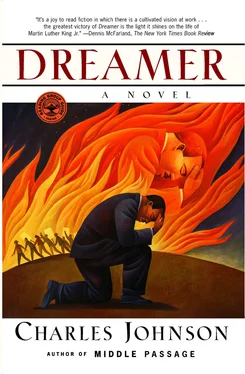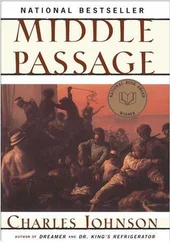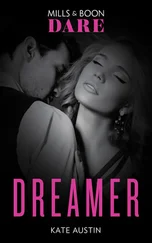Amy was shaking. “You almost hit that man!”
“Fool shouldn’ta been out.” Smith rolled his window down, now that the tear gas was behind us, and coughed. “Let’s get my things. It won’t take long, I don’t have that much.”
Actually, it would take less time than he knew. All of Smith’s belongings were piled on the street and stairs in front of 3721 Indiana Avenue. “I don’t believe this,” he whispered. On the sidewalk his shoulders slumped; he looked from his possessions dumped like refuse up to his landlady’s third-floor window. He climbed the stair, favoring his left leg, whipped out his key, and stuck it about a quarter-inch into the door before it stopped. He twisted it once. Twice, then it broke off in his hand. “She did it,” he was still whispering, staring at the fragment on his palm. “Mrs. Thomas locked me out …”
“It’s all right,” said Amy. “We can put some of this in Matthew’s car and come back later.”
Smith threw his key into the street and headed for the rear of the building. “Do what you want with it.”
“Wait! Where are you going?”
“Got some business to tend to. I’ll be back.”
After he disappeared into the alley, Amy glanced at me, shrugged, then began loading Smith’s belongings into the trunk and backseat. I moved to help, handing her a framed photograph of two young black servicemen so fit their uniforms seemed molded to their muscular frames, both grinning toward the camera, one of them (Smith, I was sure) holding up two fingers like rabbit ears behind the head of a friend I guessed was Stackhouse; and I found several paintings, one canvas portraying Jesus as a work-toughened carpenter, rendered (Amy told me) in the style of G. Bierman’s The Ascension ; another — a watercolor in the manner of Kawase Hasui — depicted an ancient temple all but hidden by jungle growth and was entitled Borobudur , while a third showed a sparsely furnished hospital room in Elgin as van Gogh might have imagined it, and in the last I saw a young black woman with three good-looking boys done in the vein of a Matisse. I stared at these paintings for the longest time, lost in them, startled by Smith’s talent, his shape-shifting ability to change styles as rapidly as others changed their garments, and then Amy was telling me to hurry up, so I moved on, passing to her some shoes eaten away at the soles, slacks and shirts so old they could only have come from rummage sales or Goodwill; there were a few dented pots and pans, a battered saxophone, a worn Bible with notecards inserted throughout its pages, sandals made of rice straw, a straight razor, a cloth bag with Chinese characters I could not read, a wicker hat, a Smith & Wesson.357 (Model 27), a seven-inch Army knife in its stiff leather sheath, and wrapped in a quilted blanket a shabby black robe and a tatami mat. Judging by the cardboard boxes at my feet, whatever Smith lacked in clothing he more than made up for in books. There were volumes from Moody Bible Institute, translations from the Coptic Gnostic Library (unearthed in 1945 near the town of Nag Hammadi in Upper Egypt), the Rhineland sermons of Meister Eckhart, the Dhammapada, texts on the Sufi and Tantrism, and on their front pages, in their margins, he had scribbled his commentaries in a script so small, so microscopic, it might have come from the hand of a mathematician. In other boxes I found Japanese pornography — magazines with page upon glossy page of photos showing teenagers (some of them dressed as schoolgirls) doing things I dare not describe, but which I guessed he used for masturbation, and then! — I saw playing cards depicting a different, more terrifying kind of pornography: Thai pictures taken in morgues, showing bodies in different stages of decomposition, used by Theravada monks for meditation on the transitory nature of all things.
With each box and shopping bag of Smith’s things I found myself falling through his past and into passageways of a constantly mutating soul which, I’d wager, even his therapists at Elgin had not fully charted. Poking through a shopping bag, I pulled out expired passports stamped by half the countries left of Hawaii, a sketchbook filled with his poetry and drawings — penciled images of well-known locations in the Loop, and possible portraits of what his own father might look like (one was a derelict feeding himself from a Dumpster, another was Daddy King) — hypodermic needles I was afraid to handle, and eight scrapbooks in which he’d pasted news articles about, I thought, himself. I looked again. These were stories about King, some of them dating back to the Montgomery bus boycott. He’d saved everything — from the Time magazine “Man of the Year” cover story on King to cartoonist Mort Drucker’s satire of the Movement in Mad magazine. Smith had flagged the numerous articles critical of King, as if he took a delicious pleasure in publicity that diminished the man he so resembled and clearly revered.
I was dazed, staring at these pages, when he came back, sweating, with the scent of gasoline on his clothes. Climbing into the car, he said, “We got to go. Right now .”
“We’re not finished,’ I said. “We’re still loading your things.”
“Forget them! We got to go now .”
Dropping one of the boxes, I climbed in. I cranked the starter as Amy closed the trunk and got in the back, then I eased out into the street. Smith grumbled, “Keep driving,” so I floored the pedal and headed south. In my rearview mirror I saw smoke billowing from his building on Indiana Avenue. Smith grinned.
“Chaym—”
“Don’t look back.” He stretched out and closed his eyes for the six-hour, three-hundred-mile trip downstate. “Musta been the rioters done that. Gonna try to get some rest.”
Amy kicked off her leather sandals, then curled up in a corner of the backseat, her head pillowed on one of the bags from Smith’s apartment. All the way to Champaign I drove in silence broken only by news reports on the radio. During the night National Guardsmen had clanked into the city like centurions to reinforce local police. The mayor’s office placed blame for the devastation on King’s presence in Chicago. Listening to that newscast, I found it easy to conclude there was precious little light in politics, which, I remembered, Henry Adams had called the “systematic organization of hatreds.” King’s efforts in Chicago had pried open a Pandora’s box of racial paradoxes, not the least being that in the wake of Black Power’s appeal in the northern ghettos his political approach was unraveling at the seams. Like so many who admired the King of 1963, the piecemeal reformist Daley championed his success in Selma, but along with his six black aldermen who controlled wards on the South and West sides, he would not concede to the anticapitalist King of 1966 that his city was a bastion of bigotry based on economic exploitation. On local television, Rev. Joseph H. Jackson pointed out to the minister that Chicago had problems but was not the Deep South. Furthermore, some said, the objectives of the Movement were hazy. Many blacks wondered if one of the fundamental goals of freedom should be the chance to live next door to white people in places like Cicero and Hyde Park. To be sure, the SCLC proved housing discrimination by sending black allies to real estate agents, who steered them away from properties they eagerly sold later that same afternoon to whites. But could a family living on $4,000 a year afford a home with a view of Lake Michigan in Winnetka? King’s critics dismissed the battle for that sort of integration as bourgeois. And for all the riveting drama of the minister’s previous campaigns, his desperate bid at sparking a fire of social change in America’s second-largest city, and regaining the reins of the Movement from modern-day Zealots eager to pick up the gun, led only that July to men and women foot-weary from marching and fires in the streets that gutted only the black ghetto. The minister traveled by police escort (many derided that) to bars, churches, and meeting halls, begging angry black crowds to replace violence with mass action aimed at disruption, sending the city officials a collective Thoreauvian no to institutionalized inequality.
Читать дальше












